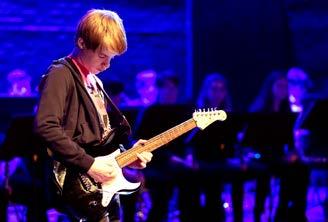4 minute read
Physics
Next Article
Gold for student at international astronomy and astrophysics Olympiad
Emma Harris (Lower Sixth) displayed stellar knowledge to strike Gold at the 2021 International Olympiad on Astronomy & Astrophysics (IOAA).
With the event unable to take place in the Colombian capital Bogota due to Covid-19 restrictions, she met up with four UK team-mates at the University of Cambridge as they undertook the contest online under test conditions.
As part of a gruelling week of competition, Emma sat a fivehour theory exam, worth 50% of the overall marks, tackling topics including cosmology, the evolution of stars and celestial mechanics – the study of the motions of celestial bodies, such as planets and asteroids, and how they interact with one another.
She also completed a three-hour data analysis paper and an observational test, which was split into a solar physics and a planetarium exam, on her way to earning the Gold award.
Emma, who was chosen to represent the UK following a training camp and her results in the British Astronomy & Astrophysics Olympiad (BAAO) and Senior Physics Challenge, was thrilled to achieve the top standard in the competition.
“I wasn’t expecting to get a Gold at all, but I’m really happy,” she said. “I knew the paper had gone well, but I didn’t think I’d answered the questions to that level, so it was a really great surprise.
“A lot depends on the questions that come up in the paper, and it happened that they suited me on the day.
“It was very intense, but well worth it. I really enjoyed solving the problems and it was especially rewarding when you have spent some time in getting to the answer. “Learning more about astronomy was also really exciting as it’s an area of physics where so much of it is in the news. It’s something many people are interested in, and you can read about it without having to understand particularly complex ideas.”

Emma also qualified for the UK team for the 2022 IOAA in the Georgian city of Kutaisi after earning Gold in this year’s BAAO.
Jay Sardesai (Upper Sixth) took Silver with Iain Lam (Upper Sixth) and Daniel Chen (Lower Sixth) securing Bronze.
Experimental project is right on time
William Dickens (Lower Sixth) was right in the swing of things as his research into pendulums took Gold in a national physics competition.
He claimed the top accolade in the British Physics Olympiad’s Experimental Project competition with his investigation into the repetitive movement of compound pendulums, such as those found on clocks.
Physics teacher Myles Thompson supervised William’s project, while the physics department technicians helped with the equipment he needed to carry out his research.
William said: “I had a metre rule, with holes drilled at different points, suspended from a stand and then had different masses I could screw on to it. It meant I could vary the amount of mass I was adding to the pendulum and the distance that the mass was from the suspension point on the stand.”
Having carried out three different experiments over a series of sessions, William created graphs to work out trends from altering the mass or distance from the suspension point.
He also had to do some extra research to explain the physics behind his findings when putting together his written evaluation, which included an overview of the methodology behind his experiments.

Olympiad achievements
Four Perse students attained the Top Gold standard in the first round of the British Physics Olympiad (BPhO).
Jay Sardesai, Iain Lam (both Upper Sixth), Emma Harris and Daniel Chen (both Lower Sixth) were among just 170 students nationally to achieve the highest grade out of 2,300 taking part.
Round one also saw Toby Collins, Andrew Hambling and Samuel Shenker (all Upper Sixth) claim Gold, while Perse students took 10 Silver and 14 Bronze awards.
In BPhO round two, Jay Sardesai claimed Gold and was among the top 12 students in the country.
Emma Harris and Iain Lam took Silver and Daniel Chen Bronze for their efforts.
Physics Challenge results
Senior Physics Challenge (for Lower Sixth): 23 Gold - top score for Emma Harris, 10 Silver, 18 Bronze.
Online Senior Physics Challenge: 24 Gold - top score for Kiran Diamond, 20 Silver, 22 Bronze.
Intermediate Physics Challenge (for Year 11 and below): 12 Gold - joint top score for Tom Hammond, Marcus Collins (both Year 10) and Dominic Rogers (Year 11), 31 Silver, 37 Bronze.
Online Intermediate Physics Challenge: 40 Gold - top score for Daniel Myhill (Year 11), 39 Silver, 10 Bronze.
Junior Physics Challenge (for Year 10 and below): 18 Gold – top score for Neelkantha Mukherjee (Year 10), 7 Silver, 3 Bronze.
Junior Astrophysics Challenge (for Year 10 and below): 10 Gold – top score for Hercules Voultsos (Year 9), 1 Silver, 5 Bronze.











